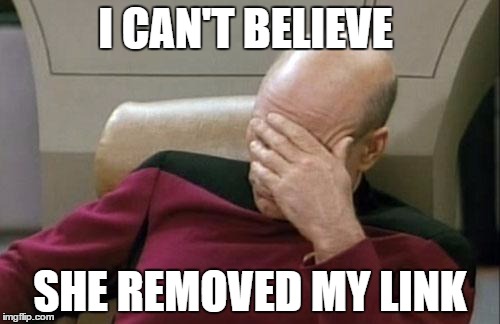- How to Approach Content
- Understanding the Target Site
- Link Placement
- Working with Editors
- Waiting to Hear Back From Editors
- Should Guest Posting be Part of Your Link Building Strategy?
- The Value of a Guest Post
- What you shouldn’t do when guest posting for links
- The Right Approach to Guest Posting for Links
- It’s Not Just About Ethics
- The Guest Posting Litmus Test
- Final Thoughts
Building links with guest posting has become controversial over the years. Several years ago, it was easy to pump out low-quality, spun, or duplicate content and trick an unsuspected blogger or webmaster into posting it for you.
Many of those guest posts were stuffed full of crazy anchor texts and wall-to-wall links. They served no purpose for any actual, human reader.
There were (and still are) huge, labyrinthine websites dedicated to nothing but spammy, unreadable articles, crammed full of links to pages most people wouldn’t want to end up on.
For guest posting as part of your link building campaign, here’s my motto:
Just because you’ve earned the guest post, doesn’t mean you’ve earned the link.
Guest posting can still be valuable, and it can still be a great method to build links. Many link building agencies and many in-house teams for many businesses still use it as an effective method to build links.
But guest posting isn’t as easy as it once was, and you’re under greater scrutiny, now, than you ever have been in the past. We have to work harder, now, and for good reason.
If you’re doing it right, guest posting won’t be an easy win.
But it can be worth your time and definitely has a place in an overall link building strategy.

And bear in mind this: the links in your content must always make sense and add value.
How to Approach Content
Guest posting doesn’t work without content. So, where do you start? What do you write? And who do you write it for?
For guest posting, there are two basic approaches:
- Method 1: Write first, pitch later
- Method 2: Pitch first, then write
For many small in-house teams and time-crunched agencies, the first method seems to make more sense. You can write a post and send it to multiple sites, without banking on only one site, who may or may not publish your work.
It can also eliminate some lengthy outreach chains—sometimes, you have to introduce yourself, make a pitch, write the post, make edits, and wait on a reply.
Also, some editors prefer you just send them a complete article, since they don’t have time for lengthy email conversations, either.

With this first method, you can also shoot your post to a couple of sites and see who replies and what sticks.
The only problem is– two or more sites might publish it at the same time, and sometimes, they won’t even tell you. Then you must fight to get one or more posts taken down, and trust me; that will burn bridges. So I’d exercise caution if you plan on sending one article to multiple publishers.
The second method takes more time, but it usually yields better results.
When you painstakingly craft a post with a site’s audience in mind, you’re more likely to get published. This is especially true if you make note of the posts their audience responds to. Find out which posts have the most shares and comments and then write in that direction.
There is still a chance they won’t accept your post, or they’ll never even get back to you. Guest posting isn’t easy.
If that’s the case, you must rework the post for another website, which will take even more time.
There’s no surefire way to make sure you’re published, but I recommend writing your content with a specific site in mind. In my experience, it’s more likely to succeed, even if it takes longer.
Writing with a specific site in mind usually delivers better results and preserves relationships.
Understanding the Target Site
If you’re going with the second method I listed in the last section, you need to understand your target site on a nearly-intimate level.
Here’s my quick method for getting to know a target site:
- Figure out the blog’s overall topic, focus, and goal
- Read 3-4 posts on the blog in full
- Read the site’s “about us” page and every author bio you encounter
- Read at least 3-4 comment threads to see how their audience responds to various posts
- Read their guest posting guidelines if they are available
- Read a few pages of their Twitter, Facebook, and LinkedIn feeds
If you want to get published on a relevant, quality site (even if it’s not a big name), you must understand the site’s audience.
Is the audience there for useful, actionable content?
Are they there for entertainment?
Are they there, just because they like the blogger’s voice and tone?
Once you’ve established that, you’ll need to figure out how to engage the target site’s audience and please their blog administrator.
Of course, I make sure it’s a real site with real people at the helm. I also make sure the site has been updated recently.
I’ll also run it through SimilarWeb to get an idea of the traffic it gets; not every guest post must target a blockbuster site, but you’ll likely want to know someone is reading it.
Creating content takes time, and there are ways to build links other than guest posting, so if you’re investing time and money into creating content, get the most value you can out of it.
Also, make note of how the webmaster wants you to send your content. If they want clean HTML and you send them a .docx or pages file, they’ll roll their eyes and ignore you.

It’s their site, so play by their rules.
Look at it from the editor’s perspective.
Here are the top reasons editors reject a guest blog (and why you should, too):
- The topic is irrelevant
- The company pitching the blog isn’t related to our industry
- The writing is terrible
- The blog is tailored to the wrong audience (B2C vs B2B or CTO vs CMO)
- The website they want us to link to is sketchy
- We’ve published a blog post from them recently
- The writing in the email is terrible and full of grammar issues
- The person hasn’t researched our business or even looked at our website
- The topic is too inflammatory
- The topic is relevant but not in line with our firm’s philosophy
- The topic is tired and overused
- There is no value for our audience
So, there you go. Get to know your target site.
All of this takes even more time, but it will lead to more successful guest posts than a “run and gun” strategy.
Keep in mind, you’re not writing for a blog, you’re writing for their readers. Learn what they care about.
Link Placement
Since guest posting is no longer the spammy, devil-may-care practice it once was, placing the actual link within your content will likely be your biggest challenge.
You can obviously link to your website in your author bio, but it may be no-follow, which won’t improve your rankings. It also may not be practical if you’re working on a client’s site.
And a bio link isn’t as valuable as an in-content link—especially when the in-content link adds value to the content itself.
Your link must enhance the content, not distract from it.
Earlier in this article, I said these types of links are acceptable in a guest post:
- Links that provide additional information
- Links that cite a reference (quotes, numbers, statistics)
- Links to related topics or another take on the same topic
- Links to an author’s previous work
- Links that provide value to the reader
Here’s the test I recommend using:
Would your editor—after publishing the article—go back and add that link if you asked? Only if it genuinely enhances the post.
So let’s take that a step further:
When you’re placing a link, build it in a way that the editor can’t remove it, because the link is so vital and indispensable to the content.

If you’re working with a credible site, you usually won’t be able to get away with linking to your homepage or a product page. There are exceptions to this rule, but they’ll require talented and creative writing.
Instead, you’ll need, what I call, a linkable asset, a page on your site you can link to within your content. Something interesting and relevant that adds credibility to your guest post.
Here are some ideas:
- A digital tool on your site
- A study or research with statistics
- An interview with an industry thought-leader
- A memorable video
- A useful infographic
There are other ideas, but I’m sure you get the picture. I’ll include further reading at the end of this section.
I also like to include at least one other link to a previous post on the target site. This shows the webmaster you’re paying attention, and it adds additional value to the reader.
Also include links to other relevant data, studies, news, or interviews. You want to serve the reader with each link, including your own.
Working with Editors
Working with blog editors is another big challenge in the realm of guest posting.
As link builders, we want to succeed. That means, we want our content published quickly, and we want to rack up some killer links in record time.
In that regard, editors can sometimes seem like a big obstacle.
A tough editor can publish a post that you worked on for 15 hours, and then strip out your link a few days later. It’s happened to me, and it’s devastating.

A tough editor can also reject your post outright, give you editing suggestions that make little sense, or stop you in your tracks.
But these editors are there for a good reason.
Tips for working with editors:
- Know the site and its tone
- Make links contextually essential
- Engage with their community
- Stay professional if rejected
A good editor protects their site’s reputation and protects their site’s audience. They’re there to make sure every piece of content on their website serves their goals, meets their audience’s expectations, and protects their brand integrity.
As business people, we can respect that.
I have three main ways of dealing with tough editors:
- I make sure I know the site before I write the post, and I make double-sure my link is essential to the article, so there’s little chance it will be removed.
- I build a relationship with the editor before I send the post, either on social media, in the target site’s comments section, or through email.
- I make sure I know exactly why I included every link in the post, and I can support why it fits and how it serves the site’s audience.
I’ll be honest, though. You really can’t win ‘em all.
If it comes down to a slugfest over a link to your site, the editor will always win. You can’t force someone to change their mind, especially on their own website.
Sometimes you’ll spend countless hours on an article and not have a link to show for it. But, it’s not all bad. Guest posting is valuable for more than just links. It brings branding opportunities, networking opportunities, and can bring in relevant traffic to your site.
No matter what, just be civil. Don’t burn bridges. Even when you feel like you’ve been robbed, move on to a different opportunity.
No one owes you a link, no matter how good your content is.
Waiting to Hear Back From Editors
I’ll keep this section brief, but know that guest posting involves a lot of waiting.

The publishing process can take days, weeks, or months. If you need results within a week, use a link building strategy other than guest posting.
Most site owners are transparent about how long they’ll take to publish. And it can take a while. After all, they have to edit, format, add images, and plug the post into their CMS. And they likely have quite a few posts in their queue.
Waiting is as much a part of the guest posting process as writing, site prospecting, and outreach.
Should Guest Posting be Part of Your Link Building Strategy?
Why Guest Posts Still Work
That same guest post with the irrelevant link was published in a magazine that has been around for more than a hundred years.
I must admit that I expected more.
Sure, it wasn’t a recent article, but it ranked high in the SERPs.
It got me thinking about how people use guest posts as a link building strategy and how some people still use the same tactics that were popular three to five years ago.
They create guest posts just for the sake of an iffy link or two.
Despite all of the hand-wringing and talking about the demise of guest posts for link building, it’s clear that some people didn’t get the message.
Just because you got the guest post, doesn’t mean you earned the link.
Personally, I prefer to build links on resource pages, but I still believe that guest posts can (and perhaps should) be used as part of an overall link building strategy—when they’re done right.
A Link Must Be Earned, Not Inserted
The real purpose of a link in any guest post is to support the content.
But so many people dress up shoddy links in their guest posts.
They bury a link to their product page in a 500-word, SEO-optimized post and hope the editor won’t notice.
In most cases, a link to a service or product page doesn’t support a guest post’s content.
We all know what an iPhone looks like, so why would you link to it?
Aside from how disgruntled and disappointed the user is when they land there, those links aren’t earned.
They’re forced into the content for SEO purposes or maybe shoehorned into the content in hopes of receiving some naive clicks. They break the user’s trust and abuse the editor’s goodwill.
Those links weren’t awarded based on merit—they were masqueraded under the cover of darkness.
Here’s what an acceptable link in a guest post looks like:
- It provides additional information: the destination link should substantiate your topic, so that it provides more value to the reader.
- It cites a reference: you should include statistics, quotes, numbers, and whatever data is necessary to drive the message home. It’s always best to link to the primary (original) source of that information.
- It’s on-topic: your destination page should be related to your topic in one way or another. It could simply expand on your point of view or provide another take altogether.
- It links to an author’s previous work: the credibility and track record of the author is essential to show that they are qualified to speak on the topic at hand.
The next time you place a link in an article, ask yourself:
Which one of those bases does it cover?
If it doesn’t pass the test, remove it. A bad link hurts your readers—and eventually, your SEO too.
The Value of a Guest Post
I chuckle when I look at someone’s backlink profile, and it only contains links from guest posts. It’s funny because it’s unnatural.
They aren’t putting any thought and strategy into link building. They’re just doing it, because somewhere along the line they read that it works.
And don’t get me wrong, guest posting works. I’ll tell you why it’s a reliable strategy, but first here’s how my friend, the late Eric Ward, put it in this interview:
“There needs to be a better understanding of what “guest posting” really means, because the term “guest posting” is a useless term in that it doesn’t define any specific strategic approach, goal, or outcome. It’s nebulous. Why are you doing it? What is the point of it? What are you hoping to achieve? Why?”
“I think of guest posting in a completely different way than many people I talk to. For example, trying to build links by writing a piece of content for somebody else’s blog, in hopes that the link will help your site rank higher is, in my opinion, a fool’s game.”
There’s tremendous value in guest posting beyond getting a link.
And links should only be used if they add value for your readers, and if not, you’re better off leaving it out. So, what can a guest post do for you?
Nurture relationships and build community
Because it’s all about who you know, right? That’s one way to put it. But in many ways, it’s really not about “who you know.”
Instead, it’s the quality of the relationships that you build that matters. And guess posting is an excellent way to build the kind of connections that will serve your business for years to come.
When you guest post on other blogs as well as invite others to blog on your site, you’re exchanging real value.
Don’t just do it for a link. Craft helpful and actionable content. Engage with readers in the comments. Show that you care about the audience. The relationships that you build as a result can be game-changing for your business.
Targeted traffic and increased reach
The most prominent advantage of guest blogging is the quality of traffic that it can generate.
If you pick the right website and create the right content, you can capture some of that audience. The way I see it, that’s even more valuable than gaining a link.
You get something better – a more extensive prospect pool that you can market your products and services to. The more prospects there are, the more chances you have to convert them into customers.
That’s the dream, right?
When it comes to customer acquisition and retention, platforms like social media and email are dominating. It’s because they increase reach and drive traffic.
Build authority
Authority is everything in the online world. It’s one of the surest ways to boost your business sustainably.
How do you build domain authority?
It’s simple. Demonstrate your expertise in a way that is truly helpful to your audience.
When you secure that authority, it does several things.
- Potential customers will be naturally drawn to you. You don’t have to do all the marketing gimmicks in the book to try to attract them.
- Providing value is a more natural and sleaze-free way to convert customers. Sure, it’s a long game, but it’s worth it.
- You immediately become top of mind every time your industry comes up. You’ll be the number one resource in your market.
Of course, these kinds of benefits don’t come easily or without a strategy. I recommend guest posting on authoritative blogs. People will give your content more credence if it’s associated with an already powerful site. If people think your content is amazing, guess what? Google will get the message, because it’s job is to serve people with information that will help them.
Build brand recognition
Guest posting is a great way to expand your brand equity.
As you increase your exposure, more people will start to recognize you. And that’s precisely what you want – to become a household name in your niche.
Each post that you publish, whether it is on your blog or somebody else’s, is a new point of contact for prospective customers. So take advantage of it.
Use a consistent writing voice. Stick to the same niche. Be congruent so that people can readily recognize you as THE authority in your space.
Build social capital
This one’s a biggie. We all know the power of social sharing and engagement. 74% of marketers agree that they can tie their social media to hard ROI.
Guest blogging is an effective way to expand your social media reach. Create content that is truly share-worthy. Add links to your social media in your bio or within the body of the article where relevant. And make sure you call readers to action. Want them to comment? Leave a question at the end of your post. Want them to share? Ask them.
Now: We’ve gone through quite a few benefits of guest posting, and there’s certainly more. But here’s the deal. None of this will be achieved if you don’t have something worth linking to. That’s right – it all comes back to content. Let’s get into how you should approach guest blogging as well as what you shouldn’t do.
What you shouldn’t do when guest posting for links
I’ll start with the absolute no-no’s, or at least, the things that will not help your business. And there are many. Avoid them, and you’ll be good to use guest posting in a way that will amp up your SEO.
Stuffing keyword-rich links in your articles.
First off, keyword stuffing is already a bad idea. Turning these keywords into anchor text for your links is even worse. Sure, there was a time where optimization was all about making sure your keywords and anchor text matched. Nowadays, that’s seen as overkill. It’s forceful, and it will hurt you.
Instead, make sure your anchor text describes the destination page. It does not have to be optimized for your target keywords. Here’s what a descriptive, SEO-friendly anchor text looks like: Including links that are not a right contextual fit for your content. Links shouldn’t just be placed where it simply doesn’t make sense for your content or your readers.
An example? Leaving a link to a product page in an article that has nothing to do with that said product. Unless it’s a product review or a resource page, that’s a terrible practice. Ensure that the link has meaning that will immediately be recognized when it’s clicked.
Outsourcing guest posts
This happens a lot, particularly when you go on a guest-posting spree and you can’t create all the content yourself. It’s even worse when the content is outsourced to a writer who isn’t knowledgeable about the topic they’re writing on. If you truly have an expert command of a topic, guest posting is a chance to demonstrate that to an audience that you can later tap into. Hiring a writer who isn’t on par with that knowledge can only undermine your authority.
Guest posting on sites with no quality control.
Here’s the scenario. You don’t have to seek the highest authority sites out there. It’s not easy, and it’s not always possible. But consider the flip side. You create a super high-quality article that would be valuable to anyone reading it.
Let’s imagine that the site you publish it on doesn’t have a content strategy, doesn’t post regularly, has no social media presence, and offers a poor user experience. What do you think the result would be? For one, it’s a waste of this great linkable asset that you’ve built. And secondly, it’s unwise to be associated with a site that has no editorial hurdle. At least ensure that the site has the basic checks and balances when it comes to user experience and content.
Using spun content across the same article.
If ever there was a textbook example of terrible SEO, this is it. Spinning content is the practice of playing around with words and sentence structure to communicate the same idea in a previously written sentence. Yes, people do that. It means for the length of the article, there’s really no substance or new ideas. This one is a no-brainer, so I won’t go into it too much. Any link builder worth their stuff wouldn’t touch articles that have been spun.
Publishing the same article across multiple sites.
Duplicate content isn’t the worse SEO offense. In fact, it may not even result in a penalty. But it does present some challenges. If the same content is published in more than one place, search engines will have a difficult time knowing which version to index and rank. This can affect your traffic and rankings because Google is unlikely to present all versions of this content in the SERPs. Then what do you do?
Guest posting as part of a reciprocal link exchange.
I know it’s an appealing idea.
You’ve developed a relationship with someone in the same niche as you (or at least, their site has some relevance to yours). Why not just guest post on their blog and they do the same for you? It’s a cunning way to build some link juice, right? Not exactly. Google also frowns upon that. If there’s a large number of links pointing to your domain from the same site, that’s a major red flag. It’s why you should be very particular about the diversity of your backlink profile.
Now: Knowing what not to do is one piece of the puzzle. Knowing the best practices is the other.
The Right Approach to Guest Posting for Links
So what’s the secret to guest posting success? More importantly, how can you approach it in a way that serves your link-building? Here’s how.
Guest post in moderation.
I wouldn’t recommend going on a link building/guest posting excursion. Be strategic about which sites you target and the timeliness of your post. This way you don’t sacrifice quality for quantity, and you don’t end up making any of the bad judgments mentioned in the previous section. Think about it. You’re more likely to outsource posts and skimp out on quality if you’re on a guest posting rampage.
Guest post for more than just a link.
If a link is the sole purpose of your guest post, you’re doing it wrong. Have a bigger, more meaningful, and more people-centric motive.

Perhaps you want to grow your email list. Then you know you actually have to produce a ton of value in your post.
You could create a post-specific content upgrade and link to a landing page.
This way you can help readers while building your email list. To me, this is the ideal measure of success for a guest post.
The more subscribers an article brings you, the more valuable it is. This could have a direct impact on your SEO as email is one of the primary traffic channels for many sites.
Create a high-quality linkable asset.
I speak about linkable assets a lot on this blog. That’s because it’s non-negotiable.
If you don’t have solid content, you’ve already lost. The good news is, it’s not hard work to build that asset. Here’s what I recommend.
1. Make sure your guest post topic meets two important criteria.
For one, it should interest the target audience. Otherwise, it won’t resonate, and they won’t engage.
Secondly, ensure that the topic is closely aligned with your blog. An easy way to find the right topic is to use Buzzsumo.
Enter your general keyword and check out all the top content. I’d also suggest conducting a simple google search. Go through several pages of content, read them, and find the right angle.
Another tip is to go on the target blog and pinpoint the top posts. Most sites will have a “popular posts” section and If they don’t, search for their domain in Buzzsumo to find their popular content.
2. Make your destination page conversion-friendly.
That doesn’t mean that you should link to landing pages that are specifically designed to convert subscribers.
You can, but this is about expanding the value of your post while getting that audience in the habit of saying yes to you.
This is how you capture their attention and draw them back to your hub. It could be something as simple as adding a call to action to connect with you on social media.
Target highly relevant and authoritative sites.
You need to find the right targets.
Here’s what doesn’t make a good choice:
- The site has no authority
- The site is irrelevant to your blog
- The site doesn’t have a decent reach
So what you want is reach, relevance, and authority.
How do find blogs that fit those criteria?
- Check their social media profiles for a sense of their social reach. The goal is not to dismiss anyone who doesn’t have hundreds of thousands of followers. It’s just to get a sense of their following, so you know what you’re working with.
- Get a feel of their influence. How? Check the level of engagement on their posts. Reach is important, but the influence that a site has is what leads an audience to take action. Look for comments, shares, user-generated content, etc.
- Use our guest post finding tool to get more detailed data. I’ll show you how.
Type in the site’s URL and click search. You’ll get a bunch of traffic statistics to help you decide which site to target.
Another neat trick is to use a tool like Ahrefs to analyze the backlink profile a particular site. I recommend analyzing your competitors. If a site links to a domain that is similar to yours, then that site would make a great target.
Treat your guest post as if it were published on your site.
It’s instinctive to want to keep the best content for your site or skimp out when you’re publishing on someone else’s site.
That’s a bad idea. It’s self-sabotaging, and the reason is simple. Your name will be attached to that content. It means the result – good or bad – will also be associated with your name.
So, treat guest posts like they are being published on your site.
Here are some ideas.
- Keep the same quality control measures. Sure, every site has its own editorial guidelines. But if you won’t publish something on your site, don’t publish it elsewhere.
- When the post goes live, engage with readers in the comments.
- Share the post with your social media community.
- Link to the post as if it were pointing to your domain. If it’s a quality article, it’s worth linking to.
It’s Not Just About Ethics
Now that you know how to go about guest posting for links, there’s more to consider. If you’re serious about this strategy, it’s important to know what’s search engine’s position on all this.
After all, this is about SEO. We’ve all heard about Google’s RankBrain, which is focused on understanding and figuring out search intent to serve up the best results that are actually valuable.
I do not doubt that Google has its way of evaluating which links are actually earned, based on merit, and are adding value to the reader.
In a similar vein, it can tell which links have just been forced and camouflaged into the content for the sake of their SEO value.
In fact, according to Cyrus Shepard that is precisely what Google engineers are trying to determine when evaluating links, so that you can arrive at a good result.
If it’s not entirely implemented into the algorithm today, it’s just a matter of time till useless links become completely devalued.
Google has in fact issued warnings against propping up your SEO with mass guest posting campaigns. Let’s say that you decide to launch a link-building campaign.
Your strategy? Write dozens of guest posts solely for a link. The result? Google will find out.
And this is not a practice that is favored. If you’re wondering if search engines take action against spammy guest blogging, the answer is simple.
Articles of low quality that include links of an equally low quality will affect all parties involved. Both the site owner and the link builder will be affected. That could happen either directly with a penalty or indirectly by doing a disservice to your audience.
The Guest Posting Litmus Test
If you plan on building links with guest posts, I have a litmus test that I use.
Let’s say there’s an article that has already been published, and you reach out to the editor or webmaster and tell them you have an additional resource to support the post. If they read your suggested resource, would they add the link?
Assuming it’s not a big deal for them to go back and make a quick edit, they should be more than willing to add the link, even after the article is published, right?
Each time you want to add a link to your own content, homepage, or even product page, go back to that litmus test.
Would your editor, who is carefully considering both the original post and the additional resource, be happy to go back and add that link after they’ve already published? They’d only add a link that actually has merit. A link you’ve earned.
Now, of course, not every publication will be willing to make any changes after an article went live, so in some instances, it may be hypothetical.
However, I’ve built many links in posts that were already live, and the webmasters added the link as an additional resource without any issue.
I know that I’m not just pulling something out of a hat here. If the link has merit, and if you’ve really earned it, the webmaster will be happy that it’s there.
Every link in your guest posts should be subject to editorial approval.
Even if you know your editor doesn’t have time to check every single link, think of it in those terms anyway. If a vigilant editor would approve that link, even after a post goes live, you know it’s a good link.
Final Thoughts
Like any link building method, guest posting takes time and practice. Even if you’re a strong writer, you still have to deal with prospecting, pitching, link placement, follow-ups, and waiting to hear back. It’s a process—and sometimes, a frustrating one.
But when done right, it works. Guest posting is still one of the best ways to build authority, attract high-quality traffic, and earn links that actually mean something. Not just for SEO, but for real visibility in your space.
That’s why I write these “realist’s guides.” Because there’s no magic formula. You can’t fake your way into great placements. You have to put in the work, build relationships, and write content that editors are proud to publish.
If you’re serious about using guest posts to earn links—and not just stick them in—I hope this gave you a solid foundation to work from.
And if you want to take things further, check out my guest post prospecting tool. It’ll help you find quality opportunities faster, so you can spend less time searching and more time writing.

Comments
Great article David. The 2nd method always works best for me. Your advice on getting to know the target site, is spot on. I would like to add, that it’s a good idea to look at content topics that may have done really well on the target site previously, but haven’t been written about in a while.
Great tip right there, James!
Great stuff, David. A thorough overview of guest posting, and you’re clearly a seasoned veteran here. Fantastic advice!
Thanks for stopping in and the kind words, Jayson 🙂
Great content is absolutely important, and the article should, of course, target the site’s audience and bring value if possible. I love your suggestion of taking the time reading a few articles and their comments to better understand the target audience.
That’s right Nirmal! Definitely worth the extra few minutes to familiarize yourself with the style and tone of the site. Thanks for stopping in 🙂
Great stuff.
I find out I have more success when I already have a target site in mind, rather than writing the article first and then finding where to post it.
Love your writeups
Glad you enjoyed it, Niyi!
An awesome and advantageous article on guest posting! Reading few other articles of yours makes me clear about the idea though. Thank you David.
Thanks so much, Srishti 🙂
Thank you for this post. I’m just starting out to guest post and think this is a wonderful guide for beginners.
You’re welcome, Daniel and best of luck with that!
How do you handle sites that want payment to place your guest post? Typically sites with good organic keyword rankings and traffic charge a fee in my experience.
This is a refreshing take on guest posting! Quality over quantity is key—gone are the days of spammy, link-stuffed posts. Authentic, valuable content that truly benefits the reader is the best way to build meaningful connections and SEO authority. What strategies do you recommend for crafting guest posts that actually resonate with audiences.